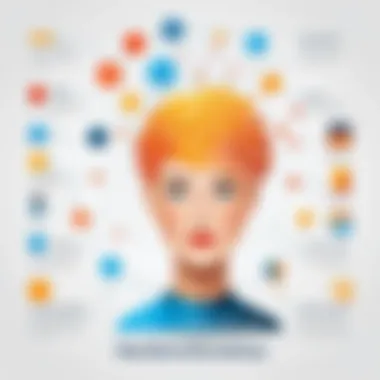Mastering Learning Techniques from Coursera


Intro
In an era where the pace of change is faster than the blink of an eye, mastering the art of learning has never been more crucial. Thanks to resources like Coursera's 'Learning How to Learn,' individuals can tap into a reservoir of strategies rooted in cognitive science that aim to enhance their ability to absorb, retain, and apply knowledge effectively. This article will take you on a journey through the key insights and practical techniques presented in the course, shedding light on how learning isn't just a task but an art form in itself.
Cognitive Science in Learning
Understanding how our brain processes information can give us the edge we need to learn efficiently. One of the central tenets of cognitive science is that the brain is not a sponge, but rather a network of pathways that can be strengthened or weakened over time. This insight transforms the way we approach learning:
- Chunking Information: Instead of trying to memorize vast amounts of content, breaking down information into manageable chunks helps in retention. For instance, rather than cramming for an exam by reading chapters in one sitting, one could read sections, reflect, and revisit the material.
- Interleaved Practice: Mixing up different subjects or skills during your study sessions can be more beneficial than focusing on one area for an extended period. For example, if you’re learning both guitar and piano, alternating practice between them can solidify your understanding of musical concepts and improve overall skill.
Given the importance of these aspects, we can start to extract meaningful strategies that empower our learning journeys.
"Learning how to learn is recognizable in several approaches, and those who embrace it often discover a newfound capability in not just acquiring knowledge, but mastering it in creative ways."
Practical Strategies for Effective Learning
Alongside the principles from cognitive science, the course presents actionable strategies that can be integrated into daily learning routines. Here are some of the most impactful practices:
- Spaced Repetition: This technique involves revisiting material at increasing intervals. Utilizing apps like Anki can make this process seamless and effective, ensuring that information moves from short-term to long-term memory.
- Mind Mapping: Visual representations of information can help map out the connections between concepts, making complex information easier to digest. Tools like MindMeister or even simple paper and colored pens can make this process enjoyable.
- Active Engagement: Engaging with the material actively—be it through group discussions, teaching others, or practical application—has shown to deepen understanding far more than passive listening alone.
These strategies embody a shift from a traditional rote memorization approach to one that encourages critical thinking and adaptability.
Ending
By leveraging insights from Coursera's 'Learning How to Learn,' individuals can transform their approach toward acquiring knowledge. As they implement these techniques, they not only enhance their own learning efficacy but also cultivate a mindset oriented towards growth and adaptability in an ever-evolving world. In a nutshell, effective learning is about finding what works best for you and navigating your educational journey with confidence.
Understanding the Learning Process
In this fast-paced world, grasping the essentials of how we learn is more important than ever. Understanding the learning process isn’t just a benefit; it’s a necessity in enhancing our ability to adapt to new challenges. This section explores what lies beneath our cognitive abilities and hones in on the strategies that can make learning more effective. As we navigate through an ocean of information, knowing how to filter and retain useful knowledge is invaluable.
Cognitive Science and Learning
Cognitive science provides a framework for dissection of mental processes involved in learning. It involves various disciplines like psychology, neuroscience, and linguistics. In simple terms, cognitive science studies how people think, learn, and remember. Understanding these paradigms gives individuals the tools to optimize their own learning methodologies.
Take, for instance, the role of working memory. It acts somewhat like a mental chalkboard, allowing us temporary space to hold information before it gets processed into long-term memory. However, working memory isn’t limitless; it has its constraints. Studies suggest that adults can typically hold around seven pieces of information at once.
"To learn effectively, one must first understand how their mind processes information."
Consider learning a new language. You often start with vocabulary that can be categorized into themes—like food, travel, or everyday conversations. This is where chunking comes into play, as breaking down language components into manageable groups makes them easier to digest and memorize.
The Neural Basis of Learning
Our brain plays a fundamental role in learning. More specifically, it’s about how neurons communicate. When we learn, neural pathways are formed and strengthened. This biological element proves that learning is not just a cognitive activity but also a chemical one. Each time we grasp a new concept or skill, we effectively sculpt these pathways in our brain.
Let’s reflect on what happens when someone practices the piano. Repeatedly playing scales strengthens the connections in the brain responsible for finger movements, leading to increased speed and efficiency. It turns a novice into a virtuoso through what neuroscientists call synaptic plasticity—the brain’s ability to reorganize itself by forming new neural connections.
This biological understanding underpins various techniques aimed at augmenting learning efficiency. Techniques such as spaced repetition are effective precisely because they align with how our brain processes and stores information over time.
By comprehending both the cognitive framework and the neural dynamics, individuals can embark on a more informed and effective learning journey.
Foundational Principles of Learning
In the realm of education and self-improvement, fundamental principles lay the groundwork for effective learning strategies. Understanding these principles is akin to setting the stage for a masterful performance, ensuring that all actors—your thoughts, resources, and techniques—operate in harmony. This section dissects these essential elements, showing how they shape one’s approach to knowledge acquisition.
Benefits of Grounding in Foundational Principles
Having a solid understanding of the foundational principles of learning can lead to better retention, deeper comprehension, and a greater ability to apply knowledge in practical settings. These principles function like a compass, guiding learners through the vast ocean of information while helping to avoid common pitfalls. In essence, grasping the foundations can transform learning from a daunting task into a more manageable and fruitful experience.
The Dangers of Overconfidence
Overconfidence in one’s abilities can be one of the biggest hurdles in the learning journey. It is that nagging feeling you get, thinking you’ve got it all figured out, only to be blind-sided by a complex concept or unexpected challenge. This overestimation of one’s knowledge can lead to stagnation. Learners might neglect necessary practice or overlook critical feedback because they assume they already understand the material well enough.


Studies show that learners who evaluate their performance too optimistically tend to underestimate the effort required to master a subject. They may rush through material, skipping essential steps and simplifying the learning process to the point of superficial understanding.
To counteract this, it’s imperative to adopt a habit of self-reflection. Asking oneself questions like, "What did I actually learn?" or "Where do I still struggle?" can create a more accurate self-image, providing the foundation for targeted improvement. Remember, in the world of learning, recognizing what you do not know is as important as celebrating what you do.
The Value of Metacognition
Metacognition—the awareness and understanding of one’s own thought processes—is an indispensable tool for learners. It is the secret sauce that empowers individuals to regulate their learning strategies effectively. This goes beyond simply absorbing information; it involves actively contemplating how one learns
Practicing metacognition can include:
- Self-assessment: Regularly checking what you’ve learned and how well you’ve retained it.
- Planning learning strategies: Choosing the right techniques before diving into a subject, like deciding whether to skim or dive deeply into materials based on your learning goals.
- Monitoring progress: Keeping tabs on your understanding while engaging with the material, which can help mitigate the risks of overconfidence mentioned prior.
"Metacognition serves as the windshield through which learners navigate their educational journey, providing clarity and direction."
In the fast-paced, tech-driven landscape we find ourselves in, harnessing metacognitive skills isn’t only beneficial; it’s essential. With countless distractions at our fingertips and a deluge of information flowing online, the ability to evaluate and adjust one’s learning approach can mean the difference between mastery and mediocrity.
Ultimately, leveraging foundational principles not only enhances personal growth but also fosters a culture of continuous learning. Engaging responsibly with these elements will carve out a path toward effective, lifelong education. Just as a sturdy tree develops from a robust root system, so too do learners flourish when grounding their practices in these core principles.
Techniques for Effective Learning
In the quest for mastering new skills, employing effective learning techniques can make all the difference. Understanding how we learn better allows us to optimize our time and effort, transforming what may seem like a daunting task into a more manageable one. With the rapid pace of change in today’s world, learning isn’t just a phase; it’s a lifelong journey. Concepts from Coursera's ‘Learning How to Learn’ course offer timeless strategies tailored for tech-savvy individuals who thrive on efficiency and effectiveness.
The techniques addressed in this section – chunking, spaced repetition, and interleaving – serve as foundational tools that every learner can leverage. These methods not only enhance understanding but also ensure that information is retained longer, which is critical in an ever-evolving knowledge landscape. Let’s delve deeper into each of these techniques.
Chunking: Breaking Down Information
Chunking is like breaking a big piece of chocolate into smaller squares. When faced with overwhelming quantities of information, individuals often struggle to scarf down the entire bar in one go, leading to discomfort and confusion. By breaking the material into bite-sized chunks, the brain can process information more easily. This technique hinges on the brain's ability to group related items—think of a phone number. It’s easier to remember 123-456-7890 than 1234567890.
Benefits of Chunking:
- Improved Memory: Grouping information allows for more efficient encoding in memory.
- Enhanced Focus: Smaller, digestible pieces help maintain concentration, which tends to wane when the content becomes too dense.
It’s akin to organizing a messy closet. Instead of tackling everything at once, clean one shelf at a time. In learning, this could mean focusing on a specific subtopic before moving on. Using this technique, learners can more effectively manage complex subjects.
Spaced Repetition: Enhancing Retention
At first glance, it may seem counterintuitive to spread out study sessions, but spaced repetition is all about timing, akin to letting marinated chicken absorb flavors over time. Instead of cramming before a deadline—often leading to short-lived knowledge—spacing out review sessions enhances long-term retention. This approach capitalizes on psychological spacing effects where information is revisited at intervals just when one might start to forget it.
Considerations for Spaced Repetition:
- Use of Technology: Apps like Anki or Quizlet embody this method, notifying users when to review based on their performance.
- Strategic Timing: Research suggests intervals can range from a few hours to days, depending on difficulty and previous exposure.
Interleaving information while employing spaced repetition can deepen comprehension. Imagine alternating between studying mathematics and history rather than succumbing to the monotony of focusing on one until completion.
Interleaving: Mixing Subjects for Better Understanding
Interleaving takes inspiration from how we experience the world. Rarely do we encounter subjects in isolation; our lives are a melange of different ideas. By mixing subjects and skills during study sessions, learners encourage their brains to form connections and recognize patterns. This method not only combats the dullness of repetitive learning but engages critical thinking.
Highlights of Interleaving:
- Connection Building: Provides a holistic view and enables learners to relate concepts across different domains, enhancing problem-solving skills.
- Active Engagement: Promotes active recall instead of passive reading, leading to a more thorough understanding of the material.
In practical terms, one might study Spanish vocabulary and chemistry equations in tandem. The juxtaposition not only reinforces memory but encourages adaptability—a valuable asset in any learning endeavor.
"Learning is not attained by chance; it must be sought for with ardor and attended to with diligence." —Abigail Adams
As we navigate the complexities of acquiring knowledge, integrating chunking, spaced repetition, and interleaving into our learning strategies can significantly upscale the efficiency of our efforts. These techniques are about taking control of the learning process, ensuring a more enriching and impactful journey.
The Role of Mindset in Learning


When it comes down to effective learning, your mindset can be the silent driver behind your success or failure. Mindset refers to the underlying beliefs and attitudes you hold about your abilities and potential. This section delves deep into the contrast between growth and fixed mindsets, and how these perceptions can shape your approach to learning.
Growth vs. Fixed Mindset
A growth mindset embraces the concept that abilities and intelligence can develop through dedication and hard work. This perspective fosters a love for learning and resilience, so important elements in the quest for mastery in any field. Individuals with a growth mindset often seek out challenges as opportunities for growth rather than threats. They understand that setbacks are merely stepping stones on the path to success.
Conversely, a fixed mindset operates from the belief that intelligence is static and unchangeable. Those holding a fixed mindset may shy away from challenges, fearing they could reveal inadequacies. This reluctance to engage can prevent them from reaching their full potential. To illustrate:
- Growth Mindset: A student who struggles with mathematics chooses to tackle complex problems, seeing it as a valuable learning experience.
- Fixed Mindset: Another student might avoid advanced math classes since they believe they simply "aren't good at math," thus missing out on growth opportunities.
Cultivating a growth mindset isn’t just a change in perspective; it requires conscious effort and intentional practice. Strategies such as celebrating small wins, reflecting on learning experiences, and actively seeking feedback can help shift attitudes toward a more growth-oriented outlook.
Resilience and Learning Challenges
Resilience is another critical aspect in the learning journey. It refers to the ability to bounce back from failure and setbacks. When faced with difficulties, resilient learners don’t simply fold; they adapt and find alternative paths to reach their goals. This tenacity often translates into better outcomes in learning and skill development.
The journey of learning can be riddled with obstacles—these can be personal, educational, or even technological hiccups. Embracing resilience means accepting that challenges are inevitable and can serve as a powerful catalyst for growth. Here are some key thoughts regarding resilience in learning:
- Perspective Shift: Rather than viewing failure as a definitive end, see it as essential feedback.
- Problem-Solving: Cultivate a toolkit of strategies to address challenges head-on. This might include seeking help, employing different study methods, or adjusting your learning environment.
- Emotional Regulation: Managing emotions in the face of adversity can also enhance resilience. Techniques such as mindfulness or journaling can play a role in processing frustrations.
In summary, a learner’s mindset significantly influences their experience and results. By understanding the factors contributing to both growth and resilience, individuals can frame their learning experiences more positively and productively. Remember, as Carol Dweck, a renowned psychologist, puts it: "Becoming is better than being." This journey of becoming is what makes learning not just an activity, but a meaningful exploration.
Applying Learning Principles to Real Life
Applying learning principles to real life is crucial, as it turns theoretical knowledge into practical application. In the fast-paced world we live in, the ability to adapt and incorporate these principles into daily life can lead to both personal and professional growth. When we understand how to learn effectively, we unlock a treasure trove of opportunities that enhance not just our skill set, but also our adaptability to change. This is particularly relevant in today’s digital age, where knowledge is at our fingertips, and the landscape is ever-evolving.
The benefits of applying learning principles are manifold:
- Increased Efficiency: By mastering techniques like spaced repetition, you can accelerate your learning. When information is organized in a manageable way, its retention rate significantly improves.
- Enhanced Problem-Solving Skills: Learning with practical examples fosters critical thinking. It allows you to tackle challenges creatively, whether they’re in the workplace or at home.
- Greater Confidence: Understanding how to learn breeds confidence. As you experience and apply learning principles, you begin to trust your abilities more.
Ultimately, it’s essential to consider that this approach is not merely a fad but a necessary skill set for anyone looking to thrive in life. Learning how to learn is a profound shift in mindset. To follow through with it, let’s dig deeper into two specific realms: how learning principles can be applied in the workplace and through lifelong learning.
Learning in the Workplace
The workspace is an ever-changing environment, often requiring quick learning and adaptation. Applying learning principles within this setting can significantly influence not only individual performance but also team dynamics and overall productivity. For instance, when companies adopt a culture of continuous learning, it encourages employees to engage actively. This leads to a more versatile workforce, able to tackle various challenges.
Here are some strategies showing how workplace learning can be enhanced:
- Collaborative Learning: Team members sharing knowledge can boost understanding and foster innovation. Even informal discussions can lead to significant breakthroughs as employees share different viewpoints and insights.
- Feedback Loops: Regularly seeking and reflecting on feedback can aid in understanding one’s learning curve. This can help pinpoint areas needing improvement, ensuring that professionals are always on the right track.
- Learning Plans: Companies can encourage employees to set specific learning goals. By doing so, workers can track progress and feel more accountable for their development.
In a digital age where remote work is becoming the norm, utilizing online resources such as Coursera for skill enhancement can provide the necessary flexibility and breadth of knowledge.
Lifelong Learning and Self-Improvement
Lifelong learning is no longer just a buzzword; it has emerged as an imperative in our society. The notion of self-improvement hinges on the commitment to continuous learning, shaping both personal and professional lives. By actively pursuing knowledge, individuals can not only keep up with advancements in technology and best practices but also enrich their life experiences.
Several facets highlight the importance of lifelong learning:
- Adaptability to Change: With rapidly changing technologies and methodologies, those who prioritize continuous education tend to adapt more easily. They can pivot when new trends emerge, maintaining relevance.
- Personal Fulfillment: Acquiring new skills or knowledge can bring a sense of achievement. Whether it’s picking up a language or learning to code, the act of learning itself elevates one’s life satisfaction.
- Networking Opportunities: Engaging in learning endeavors can broaden one’s social circle. Attending courses or workshops introduces individuals to like-minded peers, leading to new collaborations.
"The only thing worse than training your employees and having them leave is not training them and having them stay." – Henry Ford
Technological Aids in Learning
In today's fast-paced culture where knowledge comes at a premium, technological aids in learning can be the game-changer. These tools not only save time but also create pathways for deeper understanding. They serve as facilitators, guiding learners through a maze of information, ensuring they absorb what matters most without drowning in data overload. The benefits are plentiful, and their significance can't be overlooked.
Utilizing Online Course Platforms
The advent of online course platforms like Coursera and edX has transformed the learning landscape dramatically. Gone are the days when one had to commute to a classroom for lectures. Now, anyone with an internet connection can tap into a wealth of knowledge from anywhere around the globe.
These platforms provide a treasure trove of learning resources on diverse subjects. From computer science to ancient history, learners can find courses crafted by experts in the field.
One notable feature is the flexibility they offer. Learners can study at their own pace, revisiting modules when necessary. This caters well to the busy professional juggling work and personal commitments. The interactive elements such as quizzes and discussion forums foster engagement, allowing students to apply concepts in real time and discuss ideas with peers.
Moreover, it's worth noting the affordability of online courses. Many platforms offer free access to a plethora of resources, making quality education accessible to a wider audience.


Leveraging Learning Apps and Tools
In addition to online courses, a myriad of apps and digital tools have emerged as vital aids. Applications like Duolingo for language learning or Khan Academy for math can significantly enhance one's ability to learn efficiently. These tools gamify the learning experience, breaking down complex subjects into bite-sized lessons.
Highlights of using learning apps include:
- Accessibility: Available on various devices, learners can take advantage of small windows of time throughout their day, be it during a commute or a lunch break.
- Personalization: Many apps adapt to the user’s skills and pace, providing a tailored approach that focuses on areas needing improvement.
- Motivation: With features like streak tracking and reward systems, learners are more inclined to stay committed.
"The important part of using these technological aids is not just to consume information, but to understand and apply it effectively."
While the benefits are clear, it's also crucial to approach these resources with discernment. Not all apps or courses are created equal. Investigating reviews, considering expert recommendations, and engaging with community feedback from platforms like Reddit can guide users to make informed choices.
In summary, incorporating technological aids into the learning mix is not just advantageous; it may well become essential for anyone looking to stay ahead in an ever-evolving world. Combining the strengths of online course platforms with innovative learning apps creates a powerful synergy, making mastering new skills more attainable than ever.
Evaluating Learning Outcomes
Evaluating learning outcomes is a critical step that determines how effectively individuals acquire new skills or knowledge. This process goes beyond mere assessment; it digs into the essence of what has been learned and how it can be applied in real-world scenarios. Understanding this aspect provides insights into the effectiveness of various learning methods, highlighting areas of strength and those needing improvement. The benefits are manifold:
- Clarity in Goals: By defining learning objectives, students and professionals can focus their efforts on specific outcomes that matter.
- Informed Decision-Making: Evaluations lead to more informed choices regarding the learning strategies that yield the best results.
- Identification of Gaps: Through regular assessment, learners can spot deficiencies in understanding, adjusting their study tactics accordingly.
Evaluation is not merely about grades. It’s a reflective practice that involves analyzing experiences and outcomes, considering both successes and failures to inform future learning endeavors.
Measuring Progress in Learning
Measuring progress in learning is essential to ensure that individuals are not only absorbing information but also understanding and retaining it. Progress metrics can range from formal assessments like tests to informal methods such as self-reflection and peer feedback.
When engaging with online platforms like Coursera, tracking progress involves several strategies:
- Utilizing Quizzes and Assignments: These frequent checkpoints help learners gauge their understanding, ensuring concepts stick.
- Setting Personal Milestones: Creating specific, measurable goals encourages continual momentum, making the learning process feel more rewarding.
- Engagement Metrics: Analyzing time spent on sections, participation in discussions, or completion of modules can offer insight into commitment and comprehension.
Collectively, these strategies promote a deeper understanding of the learning path and encourage continuing improvement. It's about recognizing where you've come from and where you need to go, keeping the learner firmly in the driver’s seat of their educational journey.
Reflective Practice: Assessing What Works
Reflective practice is an indispensable tool for anyone serious about mastering new skills. It requires taking a step back to assess one's learning experiences critically. By doing so, individuals can understand which methods are effective and which aren't quite hitting the mark. This involves an ongoing cycle of reflection, action, and reevaluation.
Consider some practical steps to implement reflective practice:
- Journaling: Writing down thoughts after learning sessions can help identify what strategies worked and what didn’t.
- Peer Discussions: Share insights with peers; sometimes, an external perspective can highlight blind spots.
- Feedback Mechanisms: Using tools like anonymous surveys or discussion forums can provide candid feedback from peers or instructors.
Reflective practice doesn’t just enhance your retention of learned material; it fosters a culture of continuous improvement. Understanding what works allows for targeted approaches that resonate more powerfully, ultimately making the learning experience that much richer.
"Assessing what works isn’t just about pinpointing successes; it’s about recognizing failures as stepping stones for deeper understanding."
Future Trends in Learning
In today’s fast-paced world, the landscape of education is continually shifting. Traditional classroom settings are giving way to innovative techniques that reflect the demands of modern society. Embracing these future trends in learning can empower individuals to stay ahead of the curve and continually master new skills. Understanding these shifts not only highlights the importance of adaptability in learning but opens doors to countless opportunities for growth, both personally and professionally.
The Impact of Artificial Intelligence
Artificial Intelligence (AI) is transforming the way we learn. With algorithms capable of analyzing vast amounts of data, AI can personalize education to meet individual needs. Imagine a learning tool that adjusts its approach based on how well you grasp concepts. For instance, a student grappling with calculus might be served tailored resources—videos, quizzes, and readings—focusing on specific weak points. This kind of AI-driven personalization is a game-changer:
- Enhanced Engagement: Customized learning paths keep students interested.
- Efficient Learning: Minimizing time spent on areas of strength allows for focused study on challenging topics.
- Immediate Feedback: AI can provide real-time insights on progress, enabling learners to pivot swiftly when needed.
"AI is not just a tool; it's a learning partner that evolves with you."
Through AI’s capability to analyze patterns and tailor experiences, education becomes less one-size-fits-all and more of a unique journey tailored to every individual's pace and style.
Adapting to Evolving Educational Methods
The methods of teaching and learning must evolve as technologies advance. One major trend is the rise of blended learning, which combines traditional face-to-face instruction with online learning. This hybrid approach allows for flexibility, enabling learners to balance their studies with work or personal commitments. Here’s how evolving educational methods benefit learners:
- Diverse Learning Environments: Students can interact in various ways: online forums, group discussions, or video lectures.
- Self-Paced Learning: Many platforms allow learners to progress at their own speed, ensuring that they master concepts before moving on.
- Global Learning Opportunities: With online access, people can collaborate with peers from around the world, enriching their learning experience by sharing different perspectives and ideas.
In addition, concepts like project-based learning are gaining traction. Instead of rote memorization, students engage in hands-on projects that require critical thinking and creativity. This approach increases retention and allows students to see the real-world applications of their studies.
In summary, understanding future trends in learning is vital for every learner looking to thrive in a rapidly changing world. By leveraging AI and adapting to new educational methods, individuals can enhance their learning experiences and skill acquisition, making them well-prepared for whatever lies ahead.







